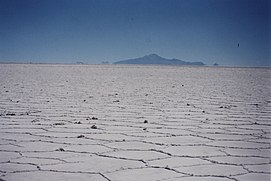Yacimientos de Litio Bolivianos
Yacimientos de Litio Bolivianos (short: YLB, translated: Bolivian lithium deposits ) is a Bolivian state-owned company that promotes the country's mineral deposits, with the focus on developing the country's rich lithium reserves . The group reports to the Bolivian Ministry of Energy and was founded in 2017 with headquarters in La Paz .
Occurrence
Lithium is considered to be an important raw material of the future, especially due to its use in batteries . There are large deposits in the so-called Golden Triangle consisting of Argentina , Chile and Bolivia. Although Bolivia is considered the country with the largest lithium reserves in the world, there has so far been no significant extraction of the coveted element in the country. There are particularly large lithium deposits in the country's numerous salt lakes, especially in the Salar de Uyuni .
target
In 2017, the Bolivian President Evo Morales launched an initiative to exploit the gigantic deposits in the country. Under this initiative, President Morales is planning a state investment of 800 million US dollars in the expansion of lithium production. In 2017, YLB was founded to advance and coordinate the lithium production project with the help of government funds and partnerships with international companies. Juan Carlos Montenegro became the first head of YLB.
Partnerships
A partnership with the Chinese CAMC group, which promotes potassium chloride on the Salar de Uyuni, has existed since 2016 . The Chinese, however, are interested in expanding the partnership to meet the large Chinese demand for lithium.
In order to establish further partnerships, YLB held intensive discussions with eight consortia from different countries who offered themselves as partners for lithium production. Finally, on April 20, 2018, it became known that YLB was interested in a partnership with a German consortium made up of ACI-Systems, a subsidiary of the ACI Group, and K-UTEC AG Salt Technologies .
On October 5th, YLB founded a joint venture with the German consortium to commercialize the Bolivian lithium reserves. YLB holds 51% of the shares in this company. The joint venture includes investments totaling 1.2 billion US dollars and the construction of three factories in Bolivia, including a lithium hydroxide plant on Salar de Uyuni, where cathodes and batteries are to be produced from the lithium reserves there . Both sides viewed the agreement as a great strategic success. The German side emphasized the importance of the availability of lithium for German industry. In addition, Wolfgang Tiefensee , the economics and science minister of Thuringia , emphasized that the funding will also be socially and environmentally compatible. On the Bolivian side, the agreement was seen as an important step towards a national value chain .
In the wake of the unrest of November 2019, the joint venture with ACISA was dissolved by decree by President Morales as one of his last official acts. After the formation of the transitional government under Jeanine Áñez, the managing director of YLB was also replaced. On January 8, it was taken over by Juan Carlos Zuleta, an analyst of the global lithium market, a regular publisher of opinion leaders and campaign leader against the participation of Germany, with good connections to the Comité Cívico of Potosí. He was dismissed from his post at the beginning of February 2020 and the economist Gunnar Valda Vargas took over temporarily.
As of February 2020, it is unclear what will become of the Sino-Bolivian joint ventures for the exploitation of the neighboring lithium deposits at Salar de Coipasa and at Pastos Grandes .
Web links
Individual evidence
- ↑ Yacimientos de Litios Bolivianos (YLB) - BNamericas . In: BNamericas . ( bnamericas.com [accessed October 17, 2018]).
- ^ Lithium mining: Bolivia's search for foreign investors . In: euronews . December 28, 2017 ( euronews.com [accessed October 17, 2018]).
- ↑ By Georg Ismar: Bolivia in lithium fever. Retrieved October 17, 2018 .
- ↑ PresseBox (c) 2002-2018: Bolivia chooses ACI Systems as a strategic partner for the industrialization of lithium deposits. Retrieved on October 17, 2018 (German).
- ↑ Bolivia: German companies "strategic partners" for lithium industrialization . In: amerika21 . ( amerika21.de [accessed October 17, 2018]).
- ↑ El economista potosino Gunnar Valda se hace cargo de la estatal YLB . In: La Razon . ( la-razon.com [accessed February 4, 2020]).
